Alkaline Water Pros and Cons
Posted by Kenton Jones on Aug 6th 2021
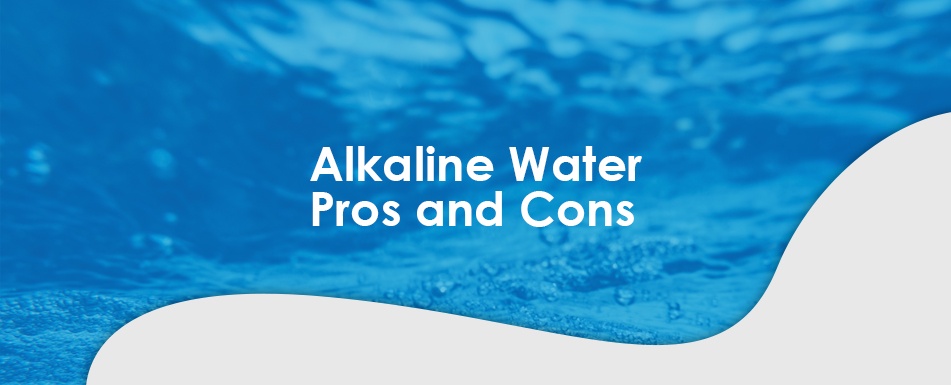
Alkaline drinking water has been one of the rising trends in health and fitness in recent years. Supporters state that regularly drinking water with higher pH levels can help cure numerous ailments. They have lauded the drink as a potential cure-all for issues ranging from poor hydration and bone loss to cancer and diabetes. As a result, many have jumped on the trend, resulting in a boom in alkaline water products hitting the market.
Is alkaline water really so powerful? Does drinking high-pH water really do so much for your health? Before you decide for yourself, it's worth your time to learn more. We've compiled a summary of the research surrounding the water and listed alkaline drinking water's pros and cons.
Contents in This Post:
Pros and Cons of Alkaline Water
What To Do If Your Water's PH Level Is High
What Is Alkaline Water?
Alkaline is another word for basic, which in chemistry refers to a substance's pH level. The pH level measures how acidic or basic something is on a scale of 0 to 14, with lower numbers being more acidic and higher numbers being more basic or alkaline.
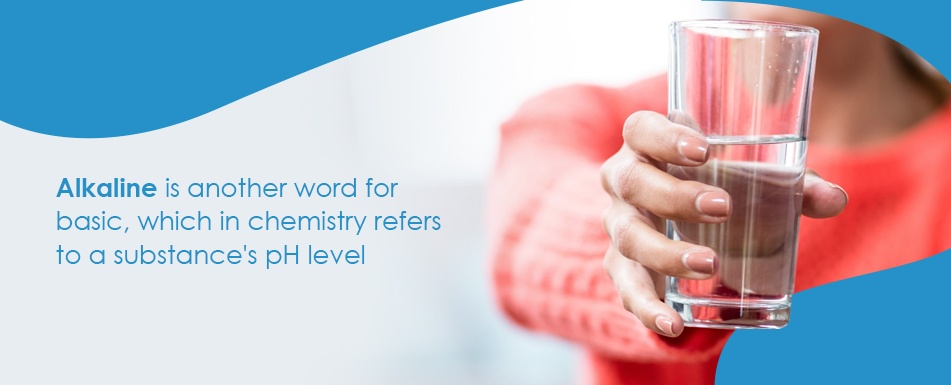
Most drinking water has a pH of 7, which is considered neutral on the pH scale. Alkaline water is more basic, typically
ranging from 8 to 10 on the pH scale. For comparison, wine and beer are somewhat acidic with an average pH of 4.0, while many household cleaners are typically more alkaline with a pH of 13 or more.
It's more than a higher pH level that makes alkaline water more basic, however. This water also contains particles of alkaline minerals that further increase the pH. It also possesses negative oxidation-reduction potential (ORP) — water's ability to act as a pro-oxidant or antioxidant. Negative ORP makes a substance more antioxidizing.
Why Is It Controversial?
Alkaline water is a controversial topic, primarily because the research doesn't always match up with the claims. Proponents of drinking alkaline water cite several health benefits, including, but not limited to:
- Colon-cleansing attributes
- Enhanced hydration
- Cancer protection
- Anti-aging properties
- Skin health
- General detoxification
- Immune system upkeep
- Weight loss
- Bone loss prevention
Many alkaline water promoters also point to the health benefits of green tea versus soft drinks. Soft drinks are notorious for their adverse health effects, and alkaline water supporters point to their positive ORP as a cause. Green tea, on the other hand, has a somewhat negative ORP and is associated with many health benefits. However, these claims are largely unsupported by science.
No scientific evidence completely verifies the claims made by alkaline water's supporters. While some research lends credence to some claims, most of the studies popularly cited by users and sellers were either paid for by alkaline water companies or are yet to be verified by peer review. Additionally, much of the research on alkaline water has been animal-based, meaning the possible effects on humans are not yet supported by science. In short, there may not enough evidence out there yet.
Where Does It Come From?
Alkaline water is either natural or manufactured. Spring water that passes over rocks and picks up particles of alkaline minerals creates naturally alkaline water. However, most people who drink alkaline water receive the manufactured version.
Electrolysis, a chemical process, produces manufactured alkaline water. In this process, an ionizer uses electricity to separate acidic and alkaline molecules. It then separates out the acidic water. However, the water is sometimes insufficiently purified before undergoing ionization, which can result in the water's contamination with pathogens or toxins. Some scientists suggest manufacturers can adequately purify water before ionizing it using reverse osmosis or filtration.
The average consumer can find alkaline water in many grocery and health food stores as well as online. Several brands specifically make alkaline water or carry it as part of their broader lineup. Consumers can also make their own alkaline water at home, either by purchasing a water ionizer or by
adding some lemon juice and baking soda to a glass.
Pros of Alkaline Water
While many of the claims about alkaline water are largely unsubstantiated, some are supported by current research. Although most of these studies require further examination or peer review to verify, they do pose interesting questions about alkaline water's benefits. Below are some of the most supported alkaline drinking water health benefits:
- Improved Hydration: Many studies suggest alkaline water can provide a better level of hydration than standard drinking water. A 2010 study in the Journal of the International Society of Sports Nutrition found that drinking alkaline water with a 10.0 pH level improved hydration status for skiers over those who drank regular water. Another study published in 2016, which analyzed the effects of drinking alkaline water after exercise-induced dehydration, found drinking high pH water improved blood viscosity significantly. Further, a study published in Biology of Sport in 2017 found that athletes hydrated with alkaline, low-mineralized water experienced better hydration status and more efficient lactate utilization following high-intensity interval exercise compared to those who drank regular water.
- Antioxidative Properties: Alkaline water has negative ORP levels, making it an antioxidant. Thus, alkaline water works well against free radicals, which are oxidizing agents that can negatively affect long-term health.
- Soothes Acid Reflux: Alkaline water consumption can help reduce acid reflux, commonly known as heartburn. Artesian-well alkaline water with an 8.8 pH could help deactivate pepsin — an enzyme that contributes to acid reflux. According to a 2018 study, drinking alkaline water and adopting a plant-based diet can also work as well as medications to reduce laryngopharyngeal reflux symptoms — a severe form of acid reflux in which stomach acid travels all the way up to the throat.
- Prevents Bone Loss: Alkaline water could help decelerate bone loss, according to some studies. However, this research is small in scale and requires further investigation. Peer reviews are necessary to verify the results, and further research is required to determine whether alkaline water can influence bone mineral's overall densit and if the body maintains this benefit long-term.
- Diabetes Management: Drinking alkaline water cannot permanently change body pH. However, some studies suggest potential benefits for particular body metrics. One 2001 study out of China, for example, suggested drinking alkaline ionized water could decrease blood pressure, blood sugar, and blood lipid levels. Thus, the water could potentially help individuals manage conditions like hypertension, diabetes mellitus, and hyperlipidemia.
All of these studies, while promising, require significant further study to substantiate and determine whether alkaline water or another source caused these results.
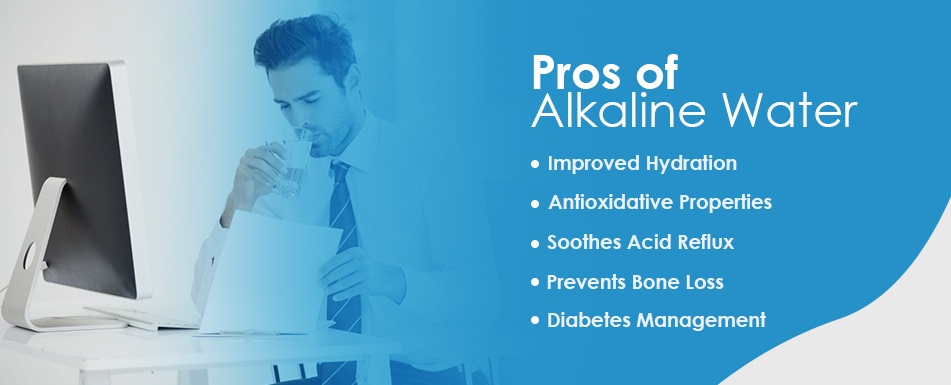
Cons of Alkaline Water
Although alkaline drinking water is generally considered safe to drink, it still poses significant cons. Some of the problems and side effects of alkaline water include:
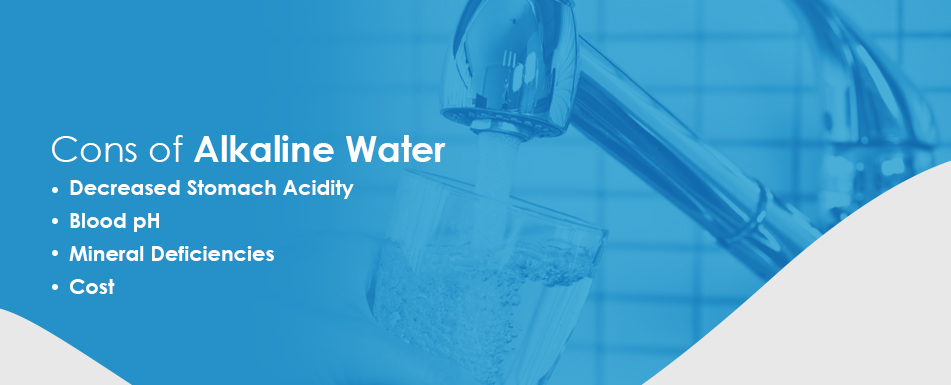
- Decreased Stomach Acidity: Stomach acid helps regulate the pH of substances that enter the body, preventing highly basic or highly acidic substances from affecting the body. Excessive alkaline water intake can temporarily reduce natural stomach acidity. Widespread problems can result, including disease and gastrointestinal distress. In extreme cases, excessive alkalinity may cause metabolic alkalosis, which can cause symptoms including nausea, vomiting, tremors, numbness and confusion. Fortunately, this condition is more often caused by an underactive parathyroid gland rather than one's diet. In most cases, the stomach's pH level will return to somewhere between 1.5 and 3.5 rapidly, and the water's effects will be temporary.
- Blood pH: Like stomach acid, the human body regulates blood pH effectively, keeping it around 7.35. Since alkaline water will not affect your blood pH level, many claims of how alkaline water will "even out" the body's acidity are unfounded.
- Mineral Deficiencies: Most of the problems with alkaline water pertain to the lack of supporting evidence surrounding it. However, consumers should consider one major health concern when drinking this water. Artificial alkaline water often contains fewer beneficial minerals than advertised, and drinking too much of it may leave drinkers deficient in minerals. Additionally, many manufacturers don't decontaminate the water to the same level they would regular drinking water, which can leave pathogenic contaminants behind.
- Cost: Alkaline water is expensive compared to most drinking water. Bottles are typically more expensive at the grocery store due to the extra processing that goes into each bottle. Home ionizers are also expensive, making it a cost-inefficient option for most people. Considering the largely marginal health benefits, most non-athletes do not find the cost worth it.

Outside of these issues, little evidence suggests any real detriments to drinking alkaline water. While one study stated
rat pups given alkaline water showed impaired growth and cardiac muscle damage, this animal study doesn't necessarily replicate results seen in human trials.
Alkaline water's primary issue is the sheer lack of proof for many claims. Any natural remedy needs evidence to show it works, and this proof simply doesn't exist for most claims made by alkaline water supporters. Most troubling of these is the claim that alkaline water can treat or prevent cancer, which has no basis in any scientific study.
Alkaline water is a promising natural remedy for some specific ailments, but it's not the cure-all some companies would have you believe. The most important thing is that your water is clean. Whether or not you use an alkaline system, Multipure can offer you a better water filtration and purification system.
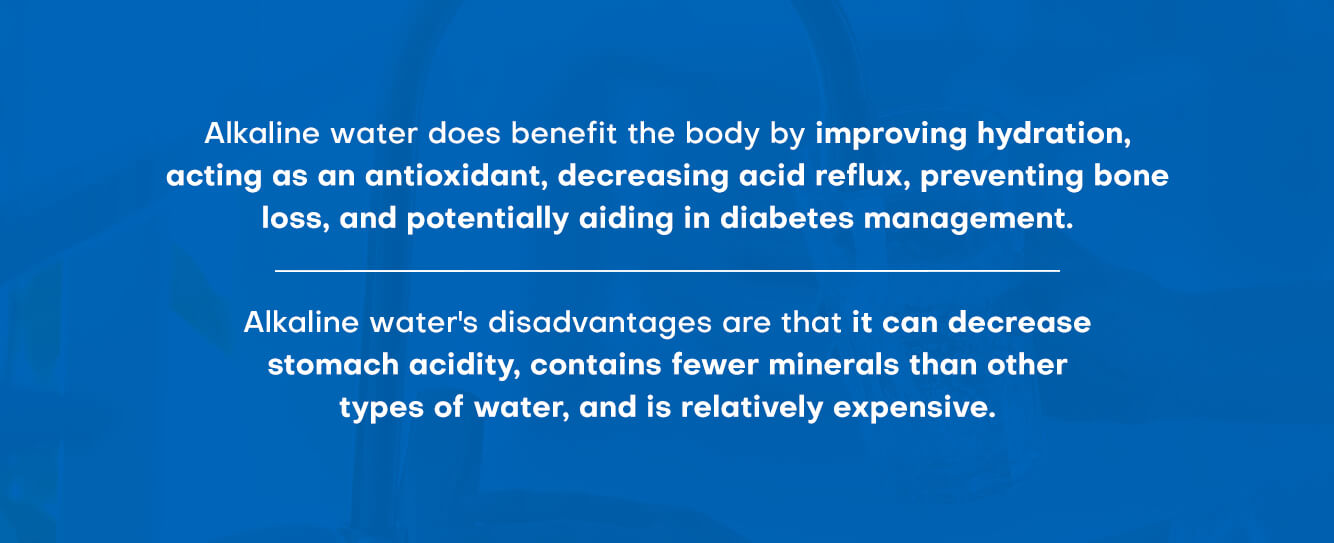
Pros and Cons of Alkaline Water
According to proponents of alkaline water, its main advantage is that it reduces acidity in the bloodstream, but scientific research has not backed up this claim about blood pH. Alkaline water benefits the body by improving hydration, acting as an antioxidant, decreasing acid reflux, preventing bone loss, and potentially aiding in diabetes management.
Alkaline water's disadvantages are that it can decrease stomach acidity, contains fewer minerals than other types of water, and is relatively expensive.
What to Do If Your Water's pH Level Is High
If you are among the
13 million households in the United States that use private wells for their drinking water, you know how important water safety is. Since the EPA does not regulate private wells or provide reports for the standards of your well, you're responsible for your water's safety. Part of this responsibility involves testing for pH levels, which you should perform at least once a year.
You can do the testing yourself or have professional water testing done. The test will likely also give you critical information about contaminant levels in your well water.
If your home water is naturally alkaline and falls within a pH range of 8 to 9, you don't need to worry about altering your water unless you want to. Naturally basic water that falls within certain parameters is largely harmless. Your most important considerations are whether your water contains contaminants, and whether it contains sufficient minerals for your health. You can resolve most of these issues with a high-quality filtration system.
Particularly high pH water, called hard water, can lead to mineral build-up in your water pipes. This build-up can negatively impact the quality of your laundry and lead to soap scum buildup. However, the most problematic issue is that it can contribute to bacterial growth. In these cases, you need a high-quality filtration system to minimize the negative effects and prevent pathogens from contaminating your drinking water.
Hard water generally responds well to treatment with a water softener, which uses an ion exchange resin to remove calcium and magnesium ions and replace them with sodium ions. It prevents the minerals from entering your home and causing buildup.
However, a water softener does not change the pH level of your home's water directly. In many cases, to address pH imbalances, you need a high-quality filtration system to minimize the negative effects and prevent pathogens from contaminating your drinking water.
If you need a high-quality filtration system for your home water, turn to Multipure. Our home drinking water systems reduce an array of contaminants to ensure clean, healthy, pH-balanced water for your family.
Learn More From Multipure
Multipure is the premier manufacturer of high-quality drinking water systems, filters, and purifiers for homes across the United States. We provide a variety of water purification devices designed to promote better water, health, and overall well-being.

For almost 50 years, we've completed extensive research to develop and manufacture some of the best drinking water treatment devices in the industry. Our innovative water filtration technology uses
carbon-based water filtration to deliver numerous benefits, including:
- Greater chemical adsorption and mechanical filtration covering a broad spectrum of contaminants
- Longer water contact time to adsorb problematic pesticides, herbicides, pathogens, and heavy metals
- Better protection against clogging due to pre-filtration that remove large particles
Multipure also provides various home essentials that
modify water for specific areas of your home — for example, filtration systems specifically designed for your shower, bath, and yard. Our products also include emergency water filtration systems that can deliver clean water when municipal water is not available. We even have portable water bottles so you can filter your water on the go.
If you're interested in improving the water quality in your home, you can trust Multipure and our extensive product line to achieve the results you want.
Contact Multipure today to answer your questions about how to improve water quality in your home.

